Main Hall, Makerere University | October 22, 2025
Makerere University held a solemn yet celebratory memorial in honour of the late Prof. Ngũgĩ wa Thiong’o — the legendary African intellectual, creative writer, and distinguished alumnus whose literary and ideological legacy continues to shape global thought.
The event, held in the iconic Main Hall and streamed online, drew together the university community, literary scholars, writers, students, alumni, and admirers of Ngũgĩ’s work. Speakers paid glowing tribute to his lifelong fight for justice, identity, and linguistic liberation, and to his enduring ties to Makerere — the place where his dream as a writer began.
“Makerere Will Forever Honour Her Son” — Prof. Sarah Ssali
Delivering the official opening remarks on behalf of Vice Chancellor Prof. Barnabas Nawangwe, Acting Vice Chancellor and Deputy Vice Chancellor (Academic Affairs), Prof. Sarah Ssali described Ngũgĩ wa Thiong’o as “our own son” whose bond with Makerere transcended time and mortality.
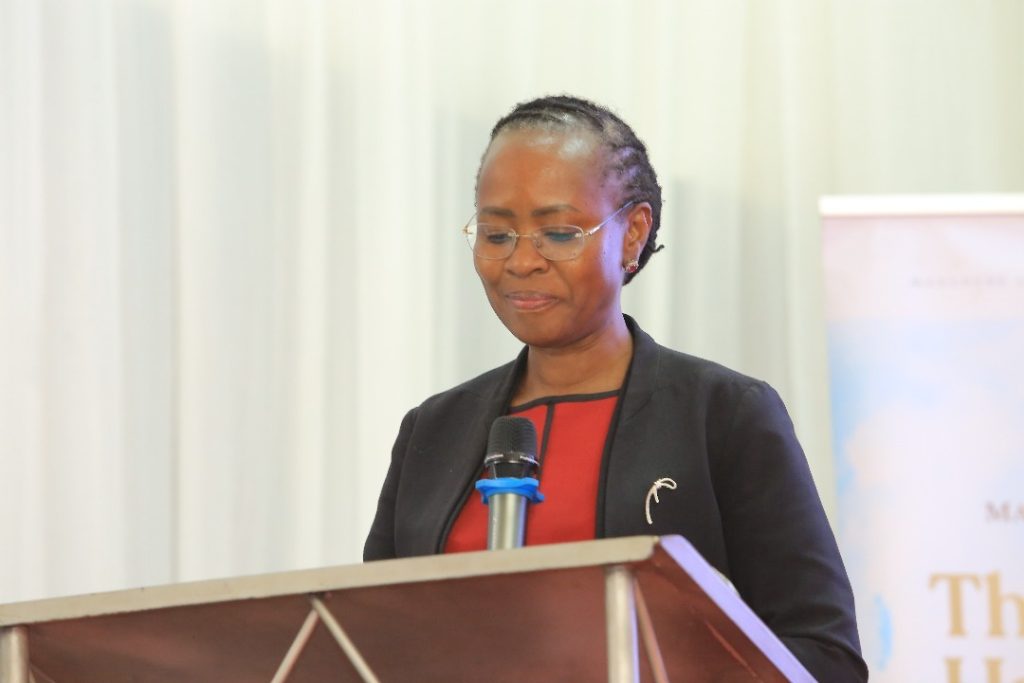
Prof. Ssali reflected on Ngũgĩ’s formative years at Makerere University College of East Africa from 1959 to 1964, where he began his literary journey and wrote his first two novels, Weep Not, Child and The River Between, while residing in Northcote Hall (now Nsibirwa Hall).
She recalled that Ngũgĩ’s play The Black Hermit — written and produced as a student to mark Uganda’s independence in 1962 — was the first play by an African to be staged at the National Theatre. “Ngũgĩ used his art not to lament but to challenge the colonial system, to tell the African story with dignity,” she said.
Prof. Ssali lauded Ngũgĩ’s fearless advocacy for African languages, noting that his 1977 decision to write exclusively in Gikuyu was “a radical act of reclaiming African humanity.” She praised him as a “consistent fighter for human dignity” and challenged students to emulate his courage and excellence.
“Makerere inspired Ngũgĩ’s creative and scholarly spirit,” she said. “His tutors predicted he would bring the College honour — and that is exactly what he did. Let us, too, build for the future as he did.”
“Ngũgĩ’s Spirit Will Always Live in CHUSS” — Assoc. Prof. Eric Awich
Representing the Principal of the College of Humanities and Social Sciences (CHUSS), Assoc. Prof. Eric Awich Ochen welcomed guests on behalf of Prof. Helen Nambalirwa Nkabala and celebrated Ngũgĩ’s deep connection with the college that nurtured his talent.
He commended the Department of Literature for spearheading the memorial, saying, “It is important that our students, in the course of their studies, participate in celebrating one of Africa’s greatest literary sons who once sat in these very halls.”
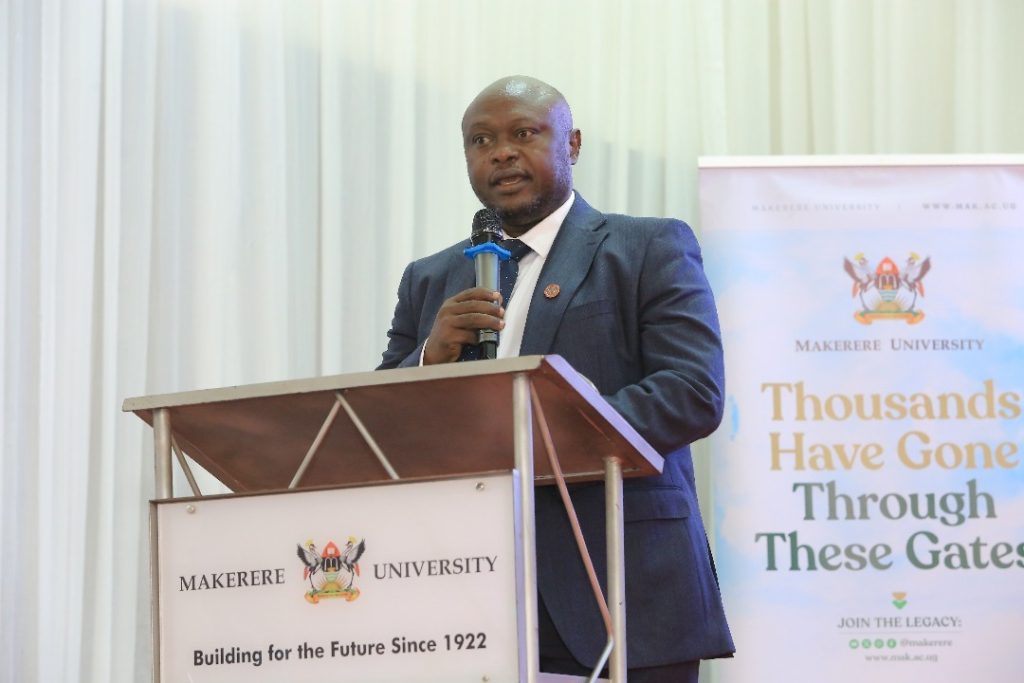
Assoc. Prof. Awich highlighted Ngũgĩ’s early intellectual life, his role in the historic 1962 Conference of African Writers of English Expression held at Makerere, and his later transformation into one of Africa’s most courageous advocates for literature in African languages.
“Ngũgĩ was a student of the human subject,” he said. “He was unafraid to challenge injustice and wore his African identity with pride. His life teaches us that conviction sometimes carries a price — but it is worth paying when one stands for truth.”
He pledged that CHUSS would continue to celebrate Ngũgĩ’s legacy and encourage students to read his works and live out his principles of integrity, intellectual courage, and service to humanity.
“A Proud Product of Literature and Language” — Prof. Sauda Namyalo
Representing the Dean of the School of Languages, Literature and Communication, Dr. Levis Mugumya welcomed guests and expressed pride that Ngũgĩ was a direct product of the Department of Literature — now under her School.
She described him as a “remarkable flagbearer” who demonstrated to the world the transformative power of the humanities.
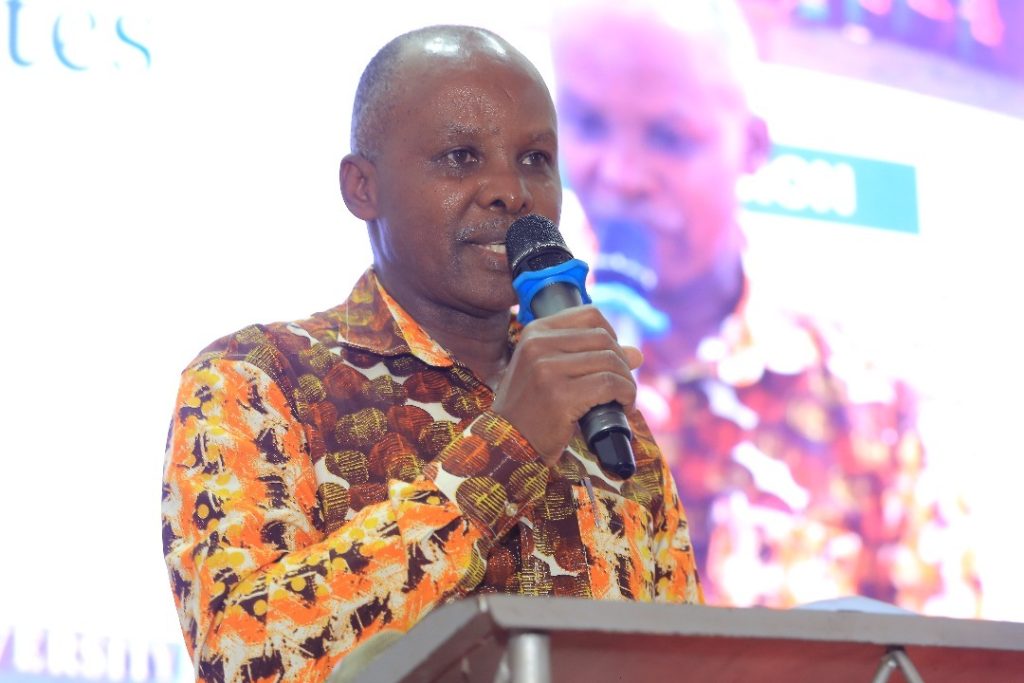
“Ngũgĩ used the knowledge he acquired here to produce creative and scholarly work that challenged the world to reflect on matters of identity, justice, and freedom,” she said.
Prof. Namyalo noted that the School continues to advance Ngũgĩ’s legacy through its commitment to developing and promoting African languages, echoing his vision for cultural liberation.
“This memorial gives us a chance to revisit our history and see how to use it to build for the future,” she added, calling on students to learn from Ngũgĩ’s humility and purpose.
“Ngũgĩ: Makerere’s Dream Weaver” — Prof. Susan Kiguli
In a touching biographical tribute titled “Ngũgĩ: Makerere’s Dream Weaver,” Prof. Susan Kiguli of the Department of Literature recounted the life and intellectual journey of Ngũgĩ wa Thiong’o, describing him as “a versatile writer, theorist, and activist whose ideas continue to shape African consciousness.”
She detailed his long and illustrious career — from his Makerere days to his tenure as Distinguished Professor of Comparative Literature and English at the University of California, Irvine — and his numerous works, including A Grain of Wheat, Petals of Blood, Devil on the Cross, Matigari, and Wizard of the Crow.
Prof. Kiguli underscored Ngũgĩ’s unwavering stance on writing in African languages and his landmark essay collection Decolonising the Mind, which remains “a watershed in postcolonial thought.” She also highlighted his founding of Mutiiri, a Gikuyu-language journal, and his leadership at the International Centre for Translation Studies.

“Ngũgĩ was a fearless intellectual who spoke truth to power and a passionate believer in the power of language to reclaim identity,” she said. “He will forever remain urgently relevant even in his physical absence.”
Keynote: Remembering a Makererean Who Changed the World
The memorial concluded with a renewed sense of pride among Makerereans, who celebrated Ngũgĩ not only as a global literary icon but also as one of their own — a man whose journey from the lecture room 4 of the University College of East Africa to the world stage embodied the university’s motto: “We Build for the Future.”
Prof. Abasi Kiyimba Calls for Reclaiming African Languages as the Final Frontier of Liberation
Delivering a moving keynote address Professor Abasi Kiyimba of the Department of Literature described the late literary icon as “a witness to his people’s history, a warrior for their dignity, and a citizen of the world.” He called on African scholars and writers to honour Ngũgĩ’s legacy by reclaiming African languages as instruments of thought, creativity, and cultural freedom.
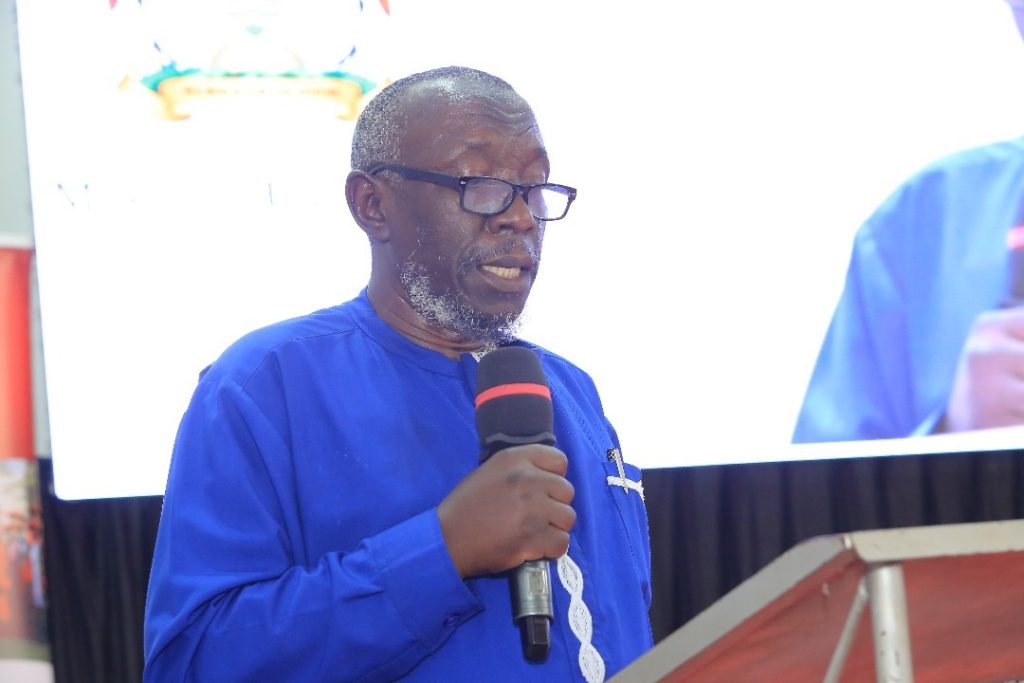
Speaking before a packed Main Hall, Prof. Kiyimba situated Ngũgĩ wa Thiong’o’s life and work within the larger story of African liberation — from political independence to the ongoing struggle for mental and cultural decolonization. “Ngũgĩ’s journey,” he said, “is the story of modern African literature itself: a story of resistance, creativity, and the enduring struggle for the liberation of the African mind.”
For Makerere University, the event carried a deeply personal resonance. “Makerere was his literary cradle,” Kiyimba recalled, “the place where young James Ngugi first found his voice.” It was at Makerere that Ngũgĩ wrote his early works The Black Hermit, The River Between, and Weep Not, Child, which laid the foundation for his lifelong dialogue with Africa and the world.
Drawing from his own encounters with the celebrated writer, Prof. Kiyimba narrated how Ngũgĩ maintained a deep attachment to Makerere even decades after leaving. Recalling a memorable meeting at a U.S. conference in 1994, Kiyimba said, “At the mention of Makerere, Ngũgĩ instinctively rose to his feet — a salute to the institution that had birthed his literary consciousness.” The two would later meet again during Ngũgĩ’s 2013 visit to Makerere, where his passion for writing in African languages remained undiminished.
The keynote traced Ngũgĩ’s evolution from James Ngugi, the English-language novelist, to Ngũgĩ wa Thiong’o, the cultural revolutionary who renounced English in favour of his mother tongue, Gĩkũyũ. Kiyimba explained that this was “not just a change of name, but a change of direction — a declaration of independence.” Ngũgĩ, he noted, saw the choice of language as an act of resistance against colonial domination and a battle for the soul of African culture.
Quoting Ngũgĩ’s famous maxim — “If you know all the languages of the world and don’t know your mother tongue, that is enslavement; but if you know your mother tongue and add all the languages of the world, that is empowerment” — Prof. Kiyimba underscored language as the final frontier in Africa’s liberation struggle. “Ngũgĩ understood that colonialism did not end with the lowering of flags,” he said, “it continued through the mind, through education, and especially through language.”
He explained that for Ngũgĩ, writing in Gĩkũyũ was both a political and philosophical statement — a challenge to Africa and the postcolonial world to rethink what it means to think, write, and dream in borrowed tongues. In Decolonising the Mind (1986), Ngũgĩ had declared his farewell to English, promising to continue writing in African languages while using translation as a bridge for global conversation.
Prof. Kiyimba also revisited the historic 1962 African Writers Conference held at Makerere, which Ngũgĩ attended as a young student. He said that the intellectual debate initiated there — particularly Obi Wali’s challenge that “true African literature must be written in African languages” — haunted Ngũgĩ for years until he eventually turned his creative pen toward Gĩkũyũ.
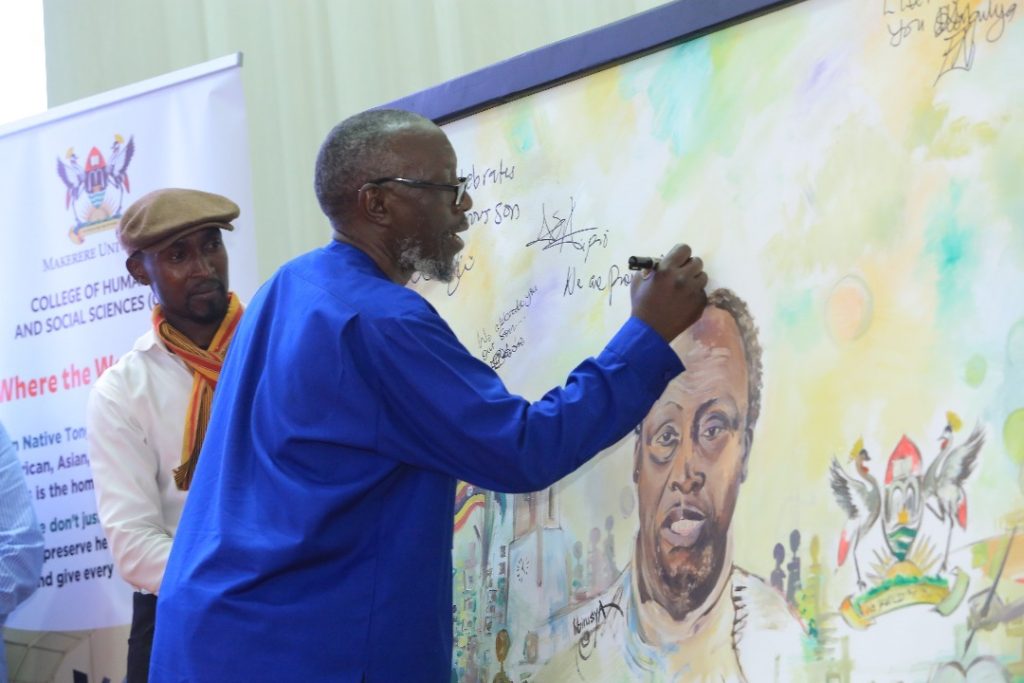
Through his address, Prof. Kiyimba wove together biography, scholarship, and personal reflection to portray Ngũgĩ as a man whose life embodied the struggle for African self-definition. He praised him as “a warrior who fought not with guns but with words — and whose battlefield was the mind.”
In his closing remarks, Prof. Kiyimba urged African scholars, educators, and parents to continue Ngũgĩ’s unfinished work: the decolonization of language and education. He warned that Africans who boast of children fluent only in English are “training them for a lifetime of mental servitude.”
“Ngũgĩ reminded us that translation, not domination, is the true path to understanding,” Kiyimba concluded. “No single people can claim a monopoly of truth, because every tongue carries a piece of it. The time has come for Africa to reclaim her voice — in her own languages, on her own terms.”
In his detailed and passionate address, Prof. Kiyimba traced Ngũgĩ’s long and courageous journey as a writer, political activist, and cultural revolutionary whose life and work embodied the intertwined struggles for freedom, identity, and language in postcolonial Africa.
Ngũgĩ and the MWAKENYA Movement: Writing as Resistance
Prof. Kiyimba situated Ngũgĩ’s experiences within Kenya’s turbulent political history. He recounted how, in the late 1970s and 1980s, the writer’s commitment to truth and justice placed him at the centre of political storm.
Ngũgĩ’s 1977 community play Ngaahika Ndeenda (I Will Marry When I Want) — performed in Gikuyu — openly criticized corruption, social injustice, and the exploitation of peasants. Its popularity, he said, alarmed the government, leading to Ngũgĩ’s arrest and detention without trial on December 31, 1977.
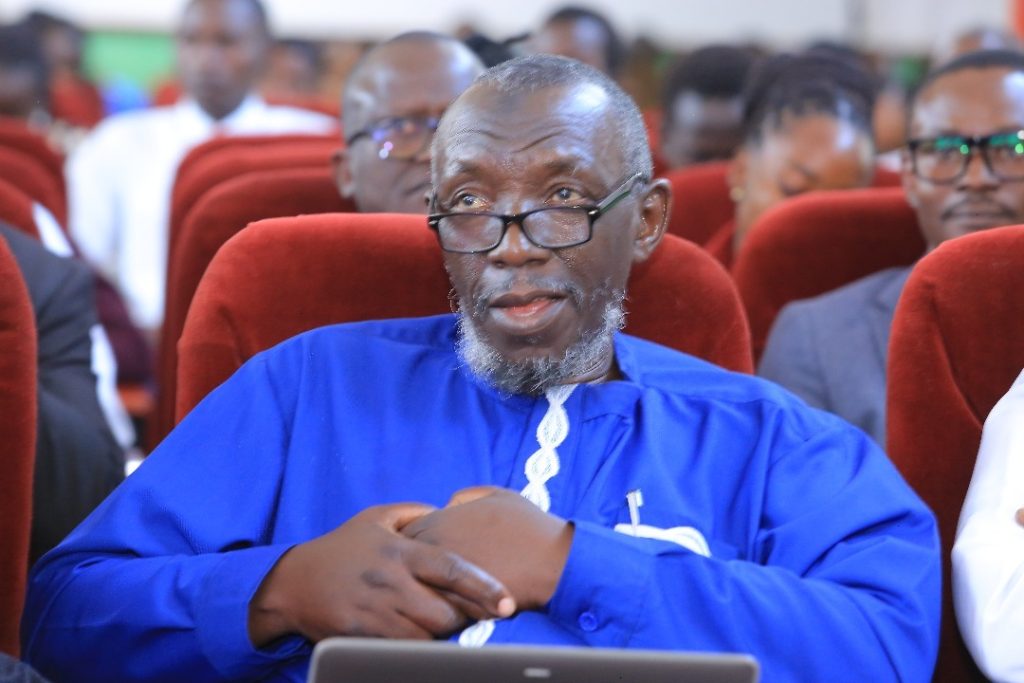
His detention coincided with the emergence of MWAKENYA — short for Muungano wa Wazalendo wa Kenya (Union of Patriots of Kenya) — a clandestine movement that opposed dictatorship, corruption, and one-party rule. Ngũgĩ’s activism and his writings, infused with socialist and Pan-Africanist ideals, were closely linked to the movement’s ideals of freedom, equality, and cultural self-determination.
The Moi government, Prof. Kiyimba explained, branded MWAKENYA as a terrorist organization and banned all of Ngũgĩ’s works from schools and universities. For over two decades, his books were removed from curricula, and those who read or discussed them risked arrest. Yet, the ban had the opposite effect — his writings circulated secretly on the black market, and his message of resistance spread further.
“Passages from Ngaahika Ndeenda and Petals of Blood were sold in the streets of Nairobi,” Kiyimba noted. “In Uganda, A Grain of Wheat remained on the syllabus, and this difference in stance even accelerated the break-up of the East African Examinations Council, leading to the formation of UNEB.”
In exile, Ngũgĩ continued to champion MWAKENYA’s ideals, using his essays and novels to expose tyranny and celebrate the resilience of ordinary people. When accused of plotting armed rebellion, he famously responded:
“I wrote a play in my mother tongue; and they responded in their mother tongue — violence. Negotiating for arms are words in their mother tongue, not mine.”
According to Kiyimba, this response epitomized Ngũgĩ’s moral courage — a writer who believed that words, not weapons, were the true tools of liberation.
Ngũgĩ the Writer: A Life Devoted to Literature
Beyond politics, Prof. Kiyimba emphasized that Ngũgĩ was first and foremost a writer. “Writing was not a job for him – it was life, a mission, a struggle,” he said. Ngũgĩ wrote across genres – novels, plays, poems, essays, memoirs, and children’s stories – leaving behind more than 40 works that together form a literary map of Africa’s postcolonial journey.
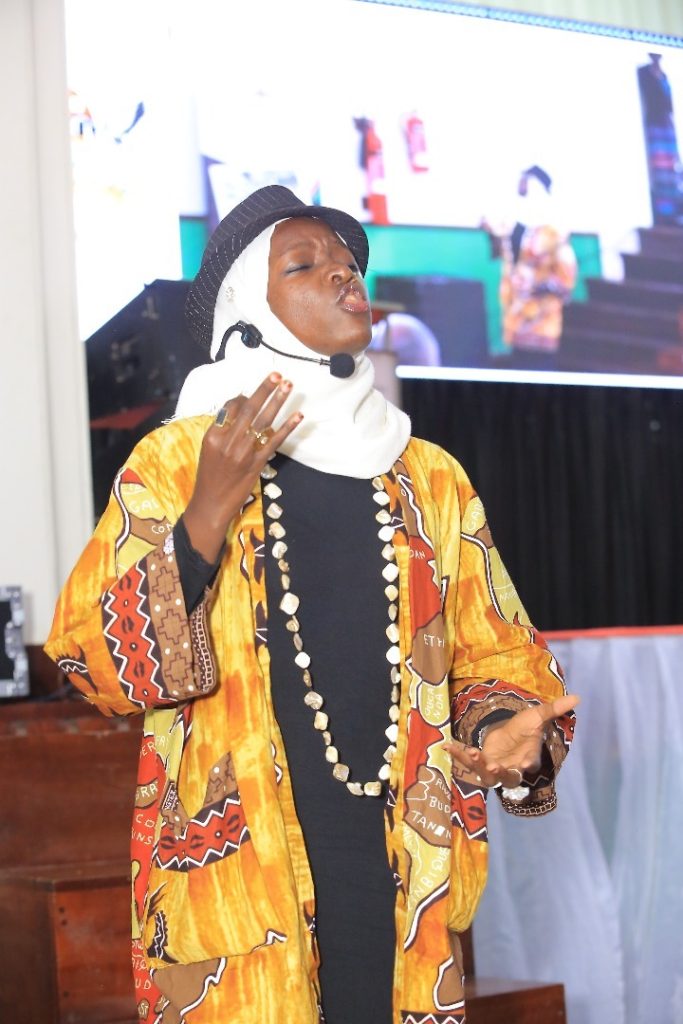
Among his novels, Weep Not, Child, The River Between, A Grain of Wheat, Petals of Blood, Devil on the Cross, Matigari, and The Wizard of the Crow stand as milestones of African literature.
Kiyimba explained that Ngũgĩ regarded himself as a novelist first, but one who respected the power of theatre to reach the people directly. “It was theatre that landed him in jail,” he reminded the audience, “but it was also theatre that liberated literature from the classroom to the community.”
When asked why he wrote in Gikuyu in his later years, Ngũgĩ often said that his early English novels were written to “impress, complain, or challenge the West.” His Gikuyu works, however, were written for his people. “Writing in African languages,” Kiyimba noted, “was Ngũgĩ’s way of moving the centre – reclaiming Africa as the heart of its own story.”
Ngũgĩ’s Philosophy of Writing: Art as Witness and Weapon
Addressing criticisms that Ngũgĩ’s writing was overly political, Prof. Kiyimba said the author dismissed such views as evasions of truth. “He was simply scrubbing where the dirt was,” he said, quoting George Orwell’s dictum that ‘all art is propaganda, but not all propaganda is art,’ and Chinua Achebe’s retort that ‘art for art’s sake in Africa is deodorized dog waste.’
Ngũgĩ’s works, Kiyimba continued, are conversations with history – mirrors that reflect both the wounds and the hopes of society. His mythological work The Perfect Nine: The Epic of Gikuyu and Mumbi illustrates this belief, grounding African identity in indigenous stories and philosophies. “It reminds us,” Kiyimba said, “that African societies have their own accounts of where they come from – and those accounts are as good as any.”
Through critical works like Decolonising the Mind, Homecoming, Moving the Centre, and Something Torn and New, Ngũgĩ redefined the role of the writer as both artist and activist. “For him,” Kiyimba said, “art divorced from its people is sterile; art grounded in their struggles transforms lives.”
Championing Children’s Literature and Cultural Renewal
Prof. Kiyimba also highlighted Ngũgĩ’s concern for children’s education, recalling his argument that “the grandmother’s fireplace is no longer available.” Writing for children, he said, was Ngũgĩ’s way of filling that cultural gap.
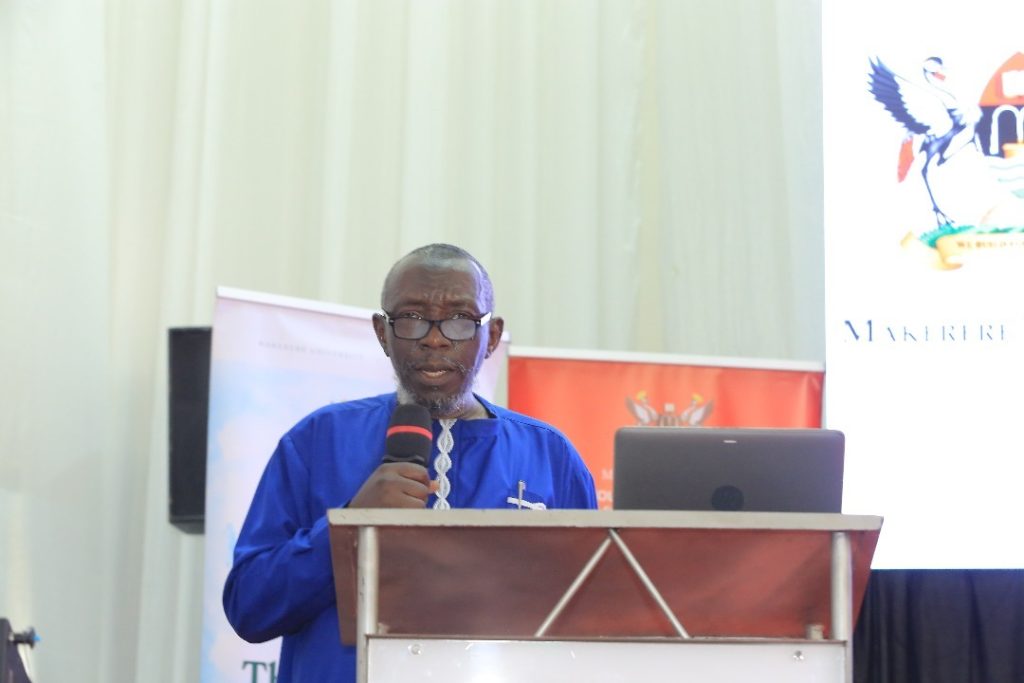
His children’s books – including Njamba Nene and the Flying Bus, Njamba Nene and the Cruel Chief, and The Upright Revolution – were written to help African children see themselves reflected in their own stories. “The West catches them young with cartoons and films,” Ngũgĩ warned, “and they are not just catching their children – they are catching ours too.”
“The fight,” Kiyimba explained, “was about giving colonial literature – full of snow, daffodils, and the Thames — a one-way ticket back to London.”
A Global Vision Rooted in Africa
Despite his global fame, Ngũgĩ remained deeply grounded in Africa. His lectures and writings drew parallels between African struggles and those of oppressed peoples elsewhere – from the Aborigines of Australia to the Irish under English rule.
“He never tired of asking,” Kiyimba said, “What does freedom mean after independence? Can a continent whose languages are silenced ever be truly free?”
Ngũgĩ envisioned an Africa that no longer sat at the margins begging for recognition, but one that stood confidently at the centre of its own story — speaking in its own tongues, writing its own futures.
The Nobel Debate and the ‘Nobel of the Heart’
Though nominated three times for the Nobel Prize in Literature, Ngũgĩ never received it. But, as Prof. Kiyimba observed, the writer himself dismissed the disappointment. “His true prize,” he once said, “was the joy of hearing that his words had touched someone’s life – the Nobel of the heart.”
African writers and critics, Kiyimba added, agreed that Ngũgĩ’s greatness cannot be measured by foreign awards but by his enduring influence on African thought, language, and liberation.
Ngũgĩ the Family Man
Amid the tributes to Ngũgĩ’s intellect, Prof. Kiyimba painted a tender picture of the man at home – a devoted husband and father who raised a family of writers. Between his wives, Nyambura and Njeeri, he had ten children, six of whom are published authors.
“At family reunions,” Kiyimba joked, “they turned editing into a competitive sport – correcting each other’s sentences before the food got cold.” It was, he said, “a home where language was not just a tool, but a shared inheritance.”
Makerere, Memory and the Next Generation
Returning to Makerere’s place in Ngũgĩ’s story, Prof. Kiyimba said the university remains central to the writer’s legacy. “Ngũgĩ’s journey from the Makerere of 1959 to the global stages of literature reminds us that great ideas often begin in humble classrooms,” he said.

To the young scholars in attendance, he urged: “Ngũgĩ’s life teaches that literature is not a luxury – it is a way of seeing, a way of being, a way of freeing the human spirit.”
A Living Ancestor
In his closing words, Prof. Kiyimba described Ngũgĩ’s life as “a long poem – written in courage, faith, and imagination.”
“He gave us stories that continue to speak to our times. He reminded us that the writer’s duty is to remember, to resist, and to renew. Ngũgĩ was the kind of man who would tell truth to power — and if power didn’t listen, he would write it down, publish it, and make sure the whole world listened instead.”
“Even those who never read him have something to remember him for,” Kiyimba concluded. “Let us celebrate him not as a departed hero, but as a living ancestor – the griot of the modern world, the keeper of the African word, the eternal Makererean. May the work you did thrive, and the languages you fought for continue to flourish.”

